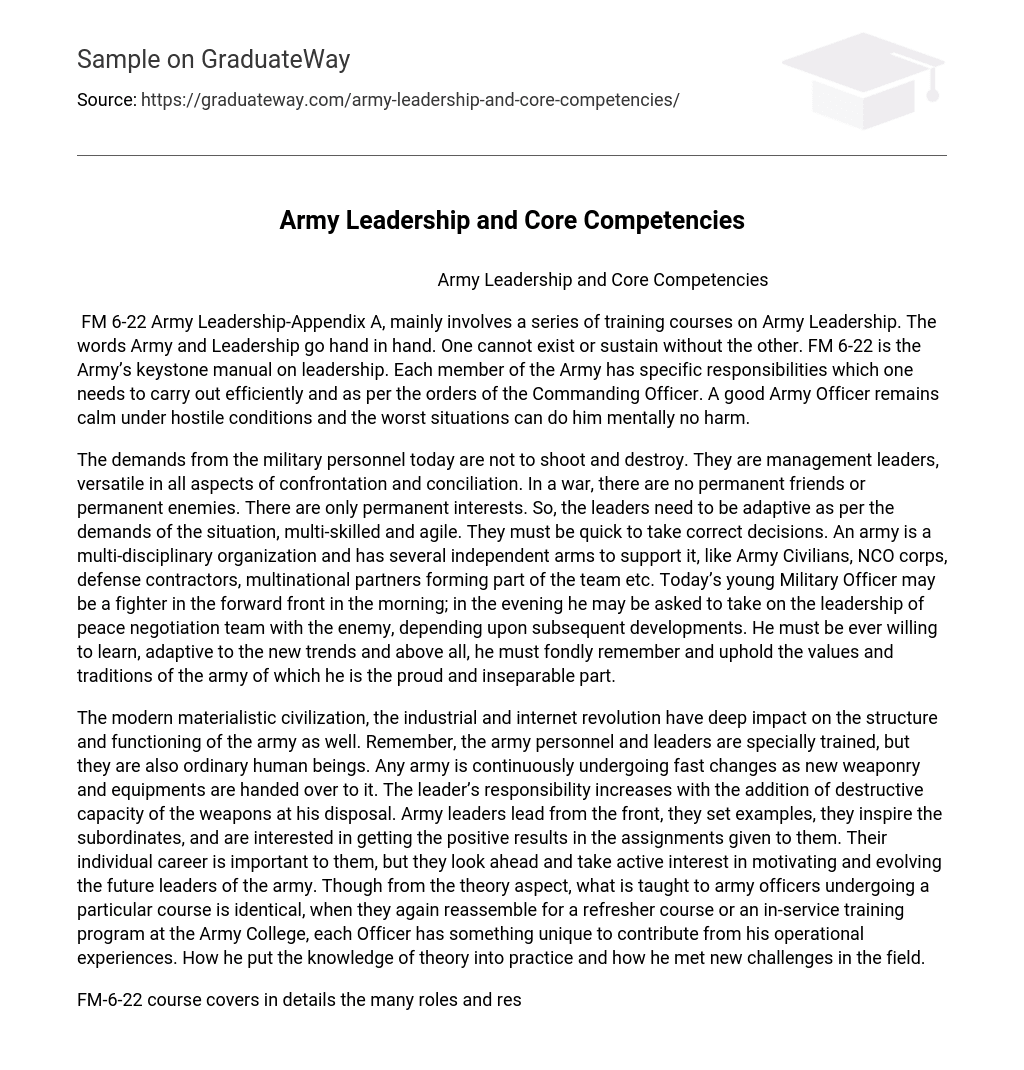. The words Army and Leadership go hand in hand. One cannot exist or sustain without the other. FM 6-22 is the Army’s keystone manual on leadership. Each member of the Army has specific responsibilities which one needs to carry out efficiently and as per the orders of the Commanding Officer. A good Army Officer remains calm under hostile conditions and the worst situations can do him mentally no harm.
The demands from the military personnel today are not to shoot and destroy. They are management leaders, versatile in all aspects of confrontation and conciliation. In a war, there are no permanent friends or permanent enemies. There are only permanent interests. So, the leaders need to be adaptive as per the demands of the situation, multi-skilled and agile. They must be quick to take correct decisions. An army is a multi-disciplinary organization and has several independent arms to support it, like Army Civilians, NCO corps, defense contractors, multinational partners forming part of the team etc. Today’s young Military Officer may be a fighter in the forward front in the morning; in the evening he may be asked to take on the leadership of peace negotiation team with the enemy, depending upon subsequent developments. He must be ever willing to learn, adaptive to the new trends and above all, he must fondly remember and uphold the values and traditions of the army of which he is the proud and inseparable part.
The modern materialistic civilization, the industrial and internet revolution have deep impact on the structure and functioning of the army as well. Remember, the army personnel and leaders are specially trained, but they are also ordinary human beings. Any army is continuously undergoing fast changes as new weaponry and equipments are handed over to it. The leader’s responsibility increases with the addition of destructive capacity of the weapons at his disposal. Army leaders lead from the front, they set examples, they inspire the subordinates, and are interested in getting the positive results in the assignments given to them. Their individual career is important to them, but they look ahead and take active interest in motivating and evolving the future leaders of the army. Though from the theory aspect, what is taught to army officers undergoing a particular course is identical, when they again reassemble for a refresher course or an in-service training program at the Army College, each Officer has something unique to contribute from his operational experiences. How he put the knowledge of theory into practice and how he met new challenges in the field.
FM-6-22 course covers in details the many roles and responsibilities of Army leaders. The levels of leadership, in the changing security environment and the role of leaders is taught and discussed. One needs to be a good leader as well as a good follower in the army. The importance of remaining as a loyal team member is highly important in the army. The attributes and skills of a leader are taught from historical incidents and evidences. How a leader is able to influence the thinking process of his followers in accomplishing the mission is discussed in depth. The leader’s ability to influence the working of the followers is an important leadership quality. In a given situation, what a leader does is no doubt important; but how he does, what he does, is more important. It is not issuing orders alone, but the manner in which the leader conducts in the overall situation, without being short-sighted matters much. The lives of the people who are entrusted with the mission are precious, and they should be put in a position to carry out the mission with minimum risks to the lives, for they need to be there on the next day to proceed on another mission. So, motivation to bring out the best in the men is an important quality of a leader. In the in-service training programs the lives and lines of actions of the leaders who inspired and motivated their men in the past are discussed. The Army Officer of the day is a special individual. The army is a composite force. The members come from different backgrounds, their educational levels are varied, and they hail from many parts of the country. This diversity is the asset of the army. They hold various positions, like Officers, non-commissioned officers, and ordinary soldiers. An army man is a cultural ambassador, defender of freedom and he or she is ever ready to take on leadership responsibilities when demanded by the circumstances.
The responsibility of the Commissioned Officers is pivotal in the army. They manage resources, decide policy matters, and command units. In emergent situations they balance risks, while caring for their people. The commission is a great honor for an army man. Special qualities like valor, fidelity, patriotism and abilities are counted. The command of a unit is given to a commissioned officer only. The warrant officers under them are technical experts, trainers, combat leaders and function in an advisory capacity. .Military bearing is noticeable in the countenance of an Army Officer. His physical fitness demands attention. Quality-wise, a military officer is composed, resilient and confident. He is the leader in favorable and unfavorable circumstances. Intellectual capacity of a leader is highly important. They are original thinkers, have the knack to arrive at quick and sound judgments. Their general knowledge as for geo-political situations in a country, their cultural traits, needs to be up to date. They are experts in tactical and technical domains. To sum up the qualities of an Army Officer in three words-it’s about leadership, leadership and leadership!
References:
- Army Leadership
- Updates appendix A and glossary. Headquarters. Department … FM 6–22. Army Leadership – Competent, Confident, and Agile. ( Cited in paras 1–7, 2–8c, 2–12d. …
- www.army.mil/usapa/epubs/pdf/r600_100.pdf





